Toggle Background Color
Game Mechanics: Basic Mechanics and Formulae
In this minor update, I'm just gonna cover a few basic mechanics and formulae to give you an idea of how this game operates.

Okay, first off, let's create a character. I'll use a Fighter as an example.
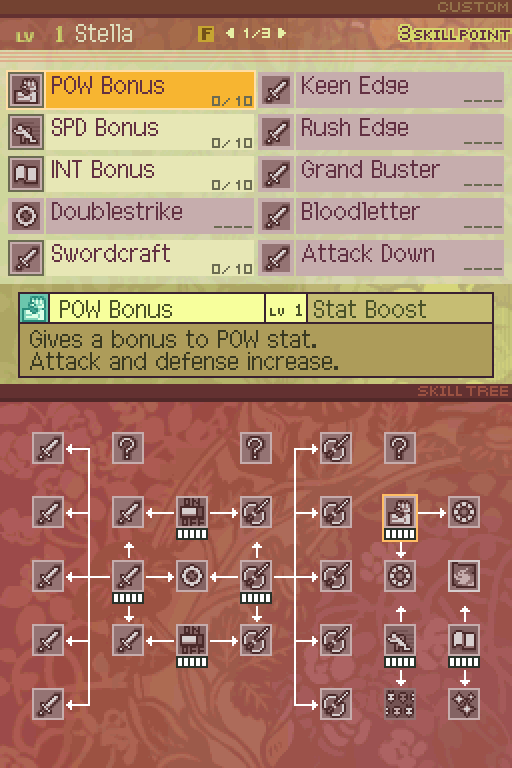
So this is the Fighter's skill tree, where they can spend their skill points to learn various skills. Some skills require the user to learn some other skills first before they can be learned. The skill map for those is helpfully shown on the bottom screen. All newly created characters start off with 3 skill points.
Skill points can only be obtained through level ups. Every time a character gains a level, they also gain 1 skill point. The exception to this is if they hit a level that's a multiple of 5, at which point they gain 2 skill points instead. For those of you familiar with Etrian Odyssey, most of this may sound familiar. However, there's one key difference between this game and the EO series that you should be aware of.
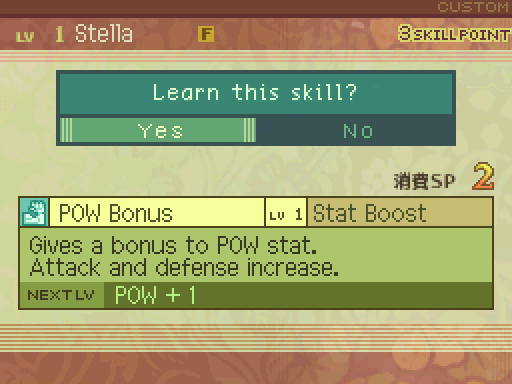
Unlike in Etrian Odyssey, where it always takes 1 point to level up a skill, 7th Dragon makes it so that sometimes, you need to spend multiple skill points to level up a skill. In some cases, the SP cost of a skill can even increase while you're leveling it up. Meaning that in some cases, it's better to save your skill points than to spend them right away.
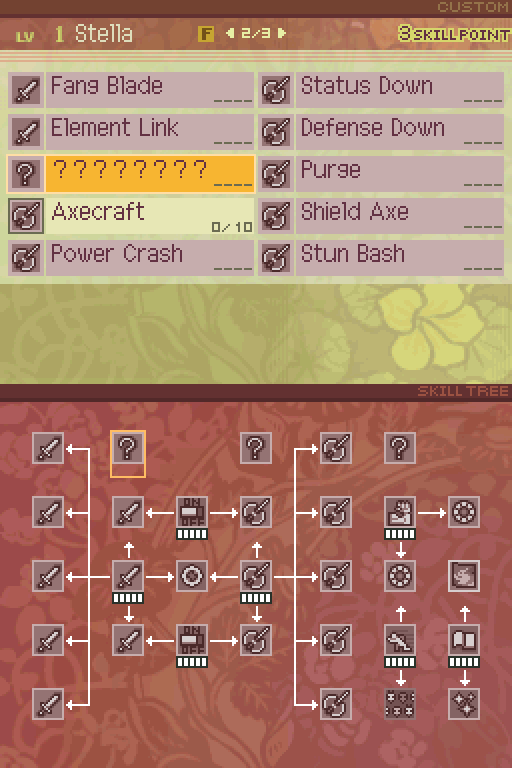
Oh, and there are a few skills for every class that you won't be able to unlock for a good while. For the record, 7th Dragon doesn't really tell you how much more powerful a skill becomes when leveling it up, but don't worry. I'm able to pull out that data to get it right out into the open.
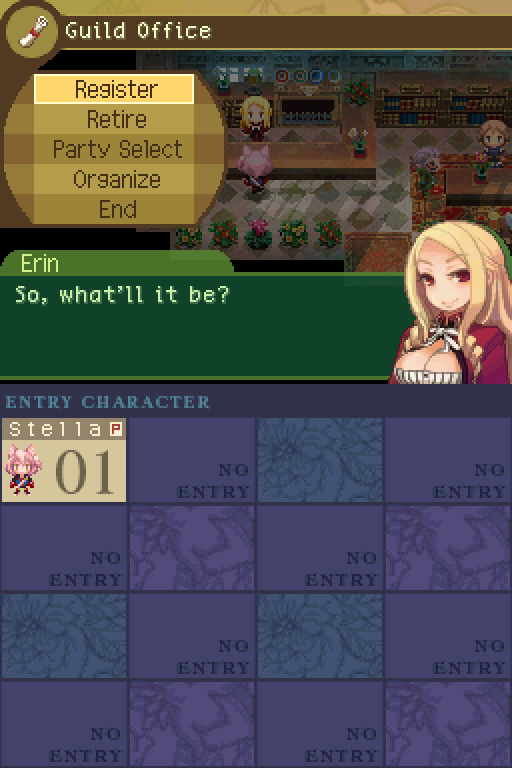
Anyways, there's something else I want to show off, but I'll have to create another character to do so.
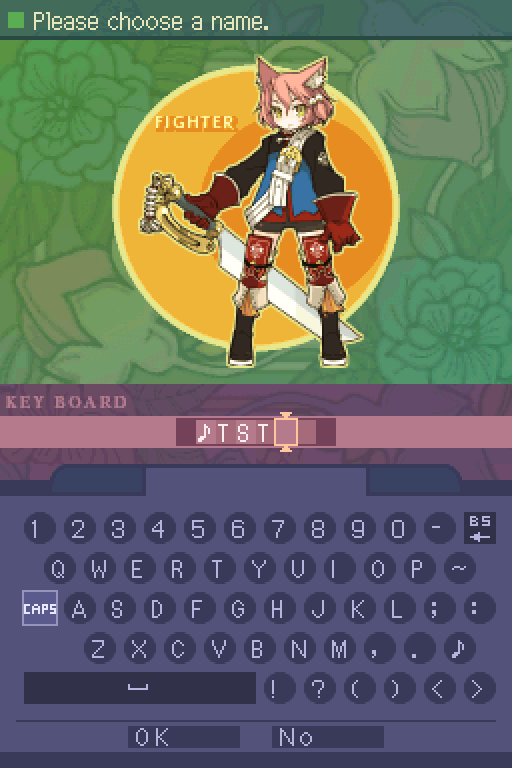
There's actually a special password you can input during character creation. Input that and then a number ranging from 1 to 28, depending on the portrait you're using.
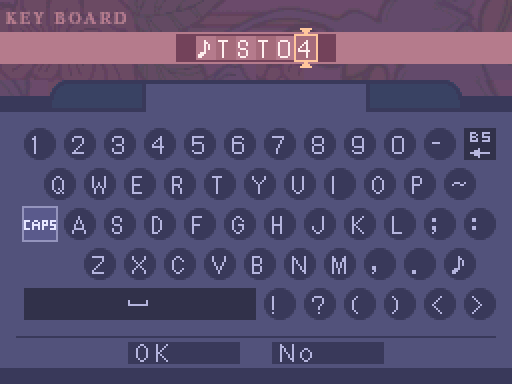
Since this is the 4th portrait out of all 28 of them, that will be the password I'll input for this one.
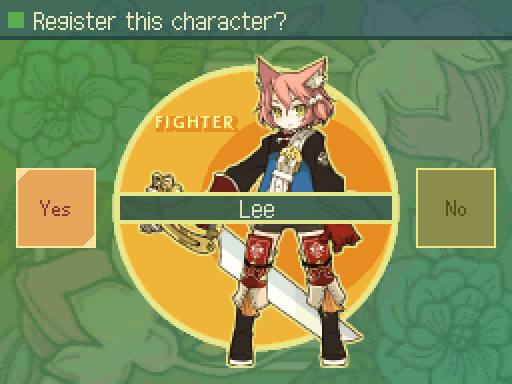
Doing so will give the character their canon name. Oh, but this isn't just an Easter Egg.
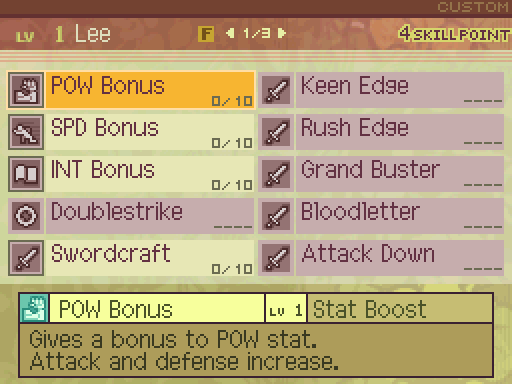
Inputting that password also gives you an extra skill point to make use of. I won't be doing this, since it really doesn't matter that much in the end, and having an extra skill point at the beginning of the game is just plain overkill since you can get some key skills you aren't supposed to get during the toughest part of the game. For the record...
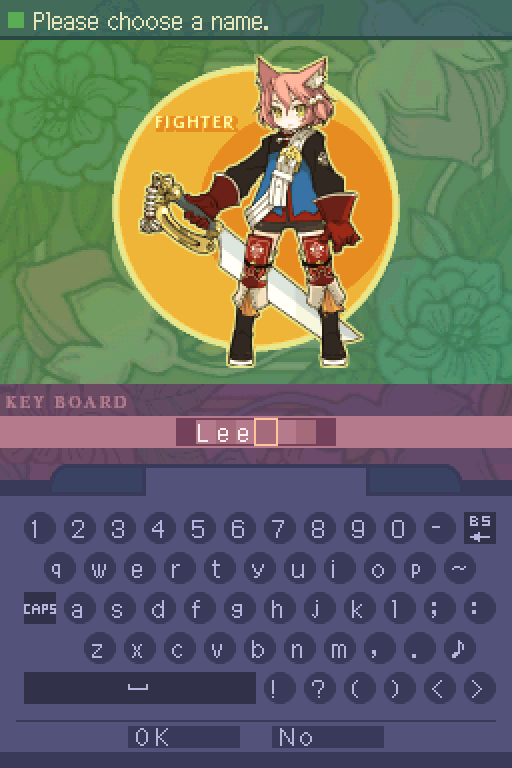
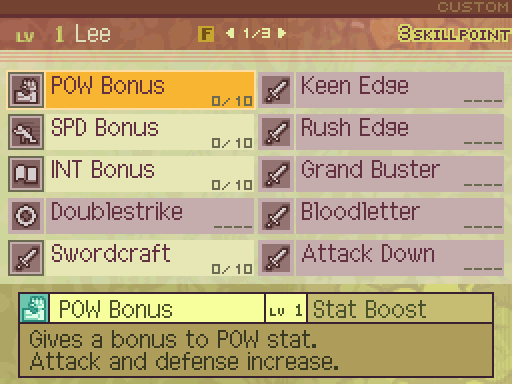
You have to put in the password to get the extra skill point. Inputting their name right away does nothing. If you're having trouble with the game, you can try doing this little trick to get a leg up.
Anyways, let's take a look at some of the formulas 7th Dragon uses. First off, the physical attack formula. The game takes a look at your physical attack stat, which is determined by this formula:
ATK = POW + (Weapon Attack * Weapon Mastery)
POW and Weapon Attack are self explanatory. The Weapon Mastery is a multiplier that most classes have to increase the power of their weapon. In most cases, this maxes out at 1.3. Since enemies don't have a weapon, they only use their ATK stat to calculate damage.
Damage = [(User's ATK – Target's DEF) + ATK Bonus] * Damage Multipliers
User's ATK and Target's DEF is self explanatory. ATK Bonus is a special attribute that some skills have, in which case they add onto the base damage calculated from stats. Damage Multipliers are the damage multipliers from skills, and the ones that belong to enemies. Critical hits only apply to regular attacks, but if they activate, the attack gets a 50% damage boost.
The final result is a bit random, but it'll be around the base damage output.
The formula for spells is... not as simple.
Damage = [(User's INT / 2) * Spell Power + (7.5 * Spell Mastery) – (Target's DEF / 2) – (Target's INT / 2)] * Damage Multipliers
The final result then has a random factor added on.
If the damage is less than 20, the random factor ranges from -2 to 2.
If the damage output is greater than 20, but less than 200, the random factor ranges from -5 to 5.
If the damage output is greater than 200, the random factor ranges from -10 to 10.
Spell Mastery is an attribute that only the Mage has. It doesn't do much, and only adds 7.5 to 22.5 points of damage depending on how high their Spell Mastery level is.
Anyways, INT is very important, and if you want your Mage to deal a lot of damage with their spells, you need to increase their INT as much as possible. Of course if you want to reduce spell damage, you need to increase both your DEF and your INT, though that's not as effective as reducing physical damage.
INT is actually used in one more formula. Namely, the healing formula.
Healing = Skill Healing Power * [1 + (0.2 * Healing Mastery Bonus)] + (INT / 5)
INT doesn't really give that much of a boost to healing, though it can help a bit.
The formula for speed is fairly simple:
Speed = SPD * Skill Speed Modifier + A random number from 0 to 10.
All skills have a speed modifier that basically influences how fast or slow the user will act when they cast it.
Ailment infliction has no formula associated with it, aside from the infliction rate being multiplied by the target's susceptibility to ailments. Ailment recovery does, and it's dependent the victim's level. I don't know the exact formula, but the bigger the victim's level, the longer they take to recover.
Speaking of ailments, let's look into Poison damage.
Poison Damage = (20 * Poison Skill Power + 3) * Poison Boosts
The damage that Poison deals is dependent upon what skill was used to inflict it, but it can also be amplified in this game.
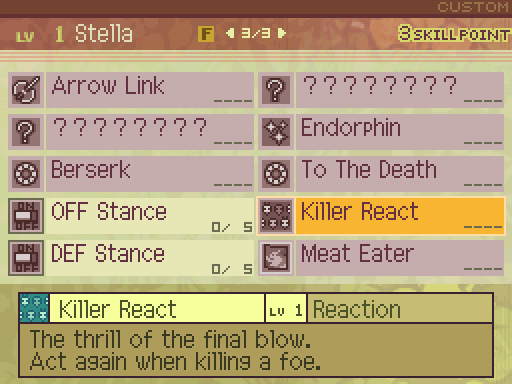
React skills are a staple of the 7th Dragon series. Most classes can use one to place a buff on themselves for a few turns. If the character fulfills a specific condition while the buff is in effect, they'll get an extra turn when the turn ends. And yes, reacts can still activate during an extra turn, so you could theoretically create a positive feedback loop where a character takes multiple actions in only 1 actual turn.
And here's the exp formula:
EXP = (Total EXP / # of living party members) * Character Multiplier
The character multiplier is a special factor that depends on the party member's level. It's determined through a separate formula.
Scaling Factor = Lowest Level in Enemy Group - Character's Level
If Scaling Factor is equal to 20 or more, Character Multiplier is equal to 1.2.
If Scaling Factor is equal to 1 to 19, Character Multiplier is equal to 1 + 0.01 * Scaling Factor.
If Scaling Factor is equal to -5 to 0, Character Multiplier is equal to 1.
If Scaling Factor is equal to -6 to -10, Character Multiplier is equal to 0.5.
If Scaling Factor is equal to -11 or less, Character Multiplier is equal to 0.25.
Basically, if you're at a lower level than intended, you'll be gaining exp pretty fast. If you're overleveled, don't expect to gain much.
All characters share 3 skills, POW Bonus, INT Bonus, and SPD Bonus. All those increase those stats by a specific amount.



POW costs twice as much as the other skills since increasing POW does increase both the character's ATK and DEF stats. Which stats should be leveled up depends on the class, though unless said skills are a prerequisite to something, they shouldn't be leveled up until you have nothing else you want to spend your skill points on.
Oh, and one last thing.
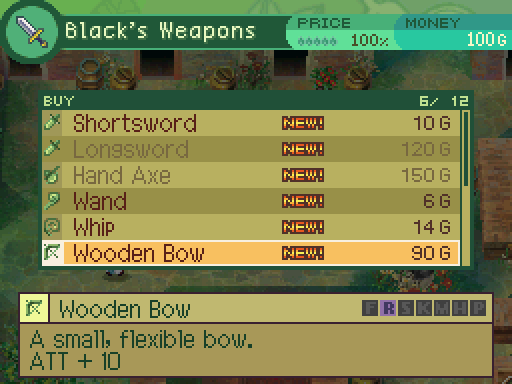
Rogues can equip Bows, which have a... special property. Namely that every time the Rogue fires an arrow from their bow, their accuracy decreases by 5% for each shot they make for the rest of the battle.
The game does not tell you that this mechanic exists at all. Your only hint that said mechanic exists is that the Rogue specifically has a skill to reset said accuracy back to normal (which is not worded all that well), and that during long battles, your Rogue will mysteriously start missing their attacks very often.
Welcome to 7th Dragon.















